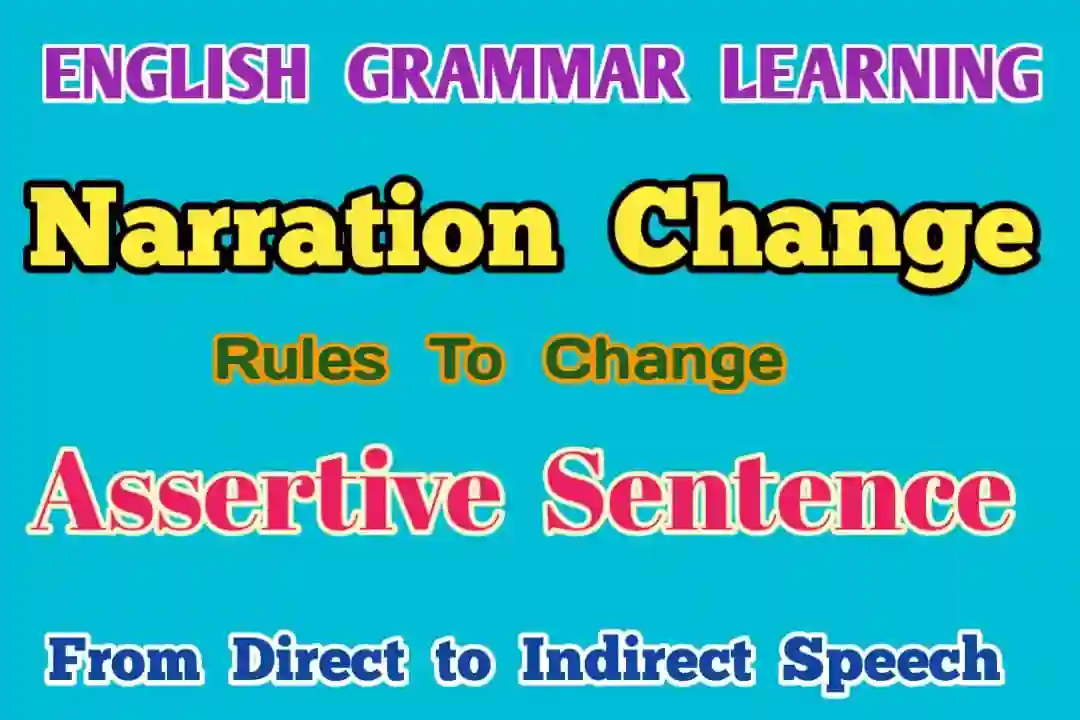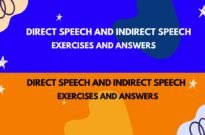The topic of Direct and Indirect Speech of Assertive Sentences (2025) holds significant importance in English Grammar. Therefore, practicing is essential to excel in the skill of transforming Direct and Indirect Speech of Assertive Sentences. This article introduces rules and examples of Direct and Indirect Speech of Assertive Sentences, along with simple steps to facilitate understanding.
Introduction to Direct and Indirect Speech
Direct speech, also known as quoted speech, involves repeating the exact words spoken by someone. On the other hand, indirect speech, or reported speech, involves conveying the meaning of someone’s words without necessarily using their exact phrasing.
Understanding Assertive Sentences
An assertive sentence is essentially a statement that presents a fact or an opinion believed to be true. It serves to assert a claim or articulate a belief or fact with clarity and confidence. Typically, an assertive sentence consists of a subject, followed by a verb and an object (S+V+O). These sentences can be either positive or negative in nature.
For example,
- I am going to the store.
- The sky is blue.
- She is not well today.
- Smith has not done his homework.
How to Identify Assertive Sentences
To identify assertive sentences, consider the following:
- Ending Punctuation: Look for a full stop (.) at the end of the sentence.
- Sentence Structure: Typically, assertive sentences follow the structure of Subject (S), Verb (V), and Object (O).
- Statement of Truth: Assertive sentences make statements that are believed to be true.
- Positivity or Negativity: They can be either positive or negative.
For example,
- He said to me, “I am ill.”
- He said to me, “I am going to the store.”
- My friend said to me, “I am not going to the store.”
- She said, “I don’t think the sky is blue.”
- The headmaster said, “The meeting will start at 10 am.”
People also search
Read also:
Rules for Transforming Assertive Sentences from Direct to Indirect Speech
Guidelines for shifting assertive sentences from direct to indirect speech are crucial for accurate communication. Understanding the rules ensures seamless transformation.
Rule 1: Identifying the Type of Sentence in Direct Speech
Initially, it’s important to find out the type of sentence enclosed within quotation marks or inverted commas in direct speech, specifically in the format of assertive sentences.
By analyzing the sentence enclosed in quotation marks, i,e. “The sky is blue,” we figure out it’s assertive. When switching from direct to indirect speech, we apply rules for assertive sentences.
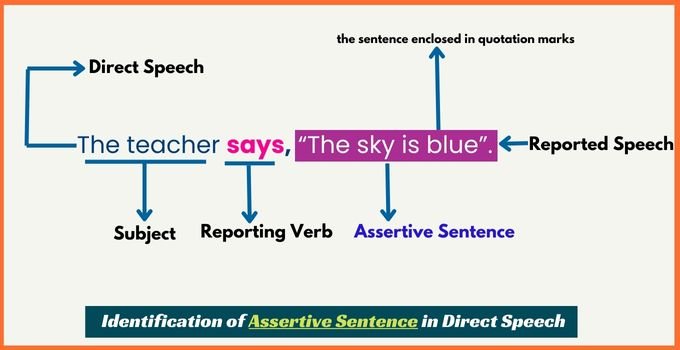
Rule 2: Reporting Verb for Assertive Sentences in Direct and Indirect Speech
In indirect narration of assertive sentences, the reporting verb typically remains “say” or “tell,” maintaining the tense consistency between direct and indirect speech. Commonly used reporting verbs in indirect narration include:
- Say
- Tell
- Reply
- Answer
- Remark
- Observe
- Inform
- State
- Mention
- Declare
- Report
- Relate
- Narrate
- Explain
- Affirm
- Deny
- Assert
- Assure
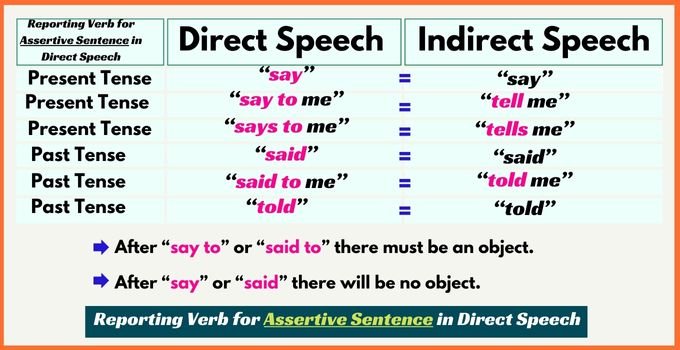
Direct and Indirect Speech of Assertive Sentences with or without object after reporting verb
For example,
Direct Narration: He said, “I am happy.”
Indirect Narration: He said that he was happy.
Direct Narration: The teacher said to me, “I shall give you the answer paper tomorrow.”
Indirect Narration: The teacher told me that he would give me the answer paper the next day.
Direct Narration: He says, “I am going to visit the Taj.”
Indirect Narration: He says that he is going to visit the Taj.
Direct Narration: You say to her, “You are going to sing today.”
Indirect Narration: You tell her that she is going to sing that day.
Rule 3: Usage of the Conjunction ‘That’ in Indirect Speech for Assertive Sentences
In indirect narration of assertive sentences, the conjunction ‘that’ follows the reporting verb ‘say’ or comes after the object of the verb ‘tell’. Alternatively, ‘that’ is positioned before the subordinate clause in indirect narration.
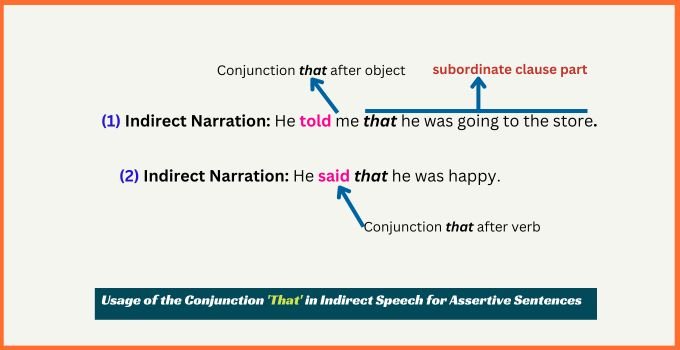
Direct and Indirect Speech of Assertive Sentences with ‘that’
Rule 4: Person Modification in Direct Speech of Assertive Sentences
Changes in persons for indirect narration have been previously addressed and should be examined attentively.
(a) first person
In indirect speech, the subject of the reported speech is replaced by the subject of the reporting verb, maintaining the same number.
| Direct Speech | Indirect Speech |
|---|---|
| She says, “I am ill today.” | She says that she is ill that day. |
(b) second person
The subject of the reported speech is replaced by the object of the reporting verb in indirect speech, while preserving the same number.
| Direct Speech | Indirect Speech |
|---|---|
| He says to me, “You can do this work.” | He tells me that I can do that work. |
(c) third person
There is no change in the person of the indirect speech when the subject of the reported speech is in the third person in the direct form.
| Direct Speech | Indirect Speech |
|---|---|
| I said, “He will not wait for his friend.” | I said that he would not wait for his friend. |
Rule 5: Alterations in Reporting Verb for Assertive Sentences
The General Rules section on the preceding page has detailed the modifications in the reporting verb in indirect narration and the verb of the reported speech, emphasizing the importance of comprehending these concepts.
Additionally, various examples exemplifying the shift from direct to indirect narration of assertive sentences have been presented, alongside discussions on changes of verbs and persons in indirect narration.
In indirect speech, different reporting verbs can be used to convey the reported statement. Below are lists of reporting verbs along with examples and explanations of their usage:
Reporting Verbs for Assertive Sentences:
1. Say
- Direct: She said, “I will come tomorrow.”
- Indirect: She said that she would come tomorrow.
- Explanation: “Say” is a generic reporting verb used to convey the reported statement.
2. Tell
- Direct: He told me, “You should study harder.”
- Indirect: He told me that I should study harder.
- Explanation: “Tell” is used when the reported statement is directed at someone specific.
3. Inform
- Direct: The teacher informed us, “The exam has been postponed.”
- Indirect: The teacher informed us that the exam had been postponed.
- Explanation: “Inform” is used to denote formal communication of information.
4. State
- Direct: They stated, “We have completed the project.”
- Indirect: They stated that they had completed the project.
- Explanation: “State” is used to express something formally or officially.
5. Mention
- Direct: She mentioned, “The meeting is at 3 PM.”
- Indirect: She mentioned that the meeting was at 3 PM.
- Explanation: “Mention” is used to refer to briefly bring something to attention.
6. Declare
- Direct: He declared, “I am innocent.”
- Indirect: He declared that he was innocent.
- Explanation: “Declare” is used to indicate a formal or public announcement.
7. Report
- Direct: The newspaper reported, “The company profits have increased.”
- Indirect: The newspaper reported that the company profits had increased.
- Explanation: “Report” is used when conveying information from a reliable source.
8. Assert
- Direct: She asserted, “I deserve a promotion.”
- Indirect: She asserted that she deserved a promotion.
- Explanation: “Assert” is used to express confidence in a statement.
9. Explain
- EDirect: He explained, “The process is quite simple.”
- Indirect: He explained that the process was quite simple.
- Explanation: “Explain” is used to clarify or make something understandable.
10. Narrate
- Direct: She narrated, “The story has a happy ending.”
- Indirect: She narrated that the story had a happy ending.
- Explanation: “Narrate” is used to describe or recount events or stories.
These reporting verbs are used to effectively convey the reported speech in indirect narration while providing nuances in meaning and context.
Examples of Direct and Indirect Speech of Assertive Sentences 2025
Note carefully the Change of Assertive Sentences from Direct Speech to Indirect Speech.
Direct: The boy said, “I’ll do the work now.”
Indirect: The boy said that he would do the work then.
Direct: He said, “I am glad to be here this evening.”
Indirect: He said that he was glad to be there that evening.
Direct: He said, “I shall go to Delhi tomorrow.”
Indirect: He said that he would go to Delhi the next day.
Direct: He said, “I have never seen anything like it.”
Indirect: He said that he had never seen anything like it.
Direct: Bimal said to him, “You should be more careful.”
Indirect: Bimal told him that he should be more careful.
Direct: He said, “I have passed the examination.
Indirect: He said that he had passed the examination.
Direct: He said, “I passed the examination.”
Indirect: He said that he had passed the examination.
Direct: He said, “I was playing football.”
Indirect: He said that he had been playing football.
Direct: He said, “I shall play football.”
Indirect: He said that he would play football.
Direct: He says, “I shall help the poor.”
Indirect: He says that he will help the poor.
Direct: You will say, “I do not take tea.”
Indirect: You will say that you do not take tea.”
Direct: They said, “We are not afraid.”
Indirect: They said that they were not afraid.
Direct: She said, “I am working in the garden.”
Indirect: She said that she was working in the garden.
Change the mode of narration of Assertive sentences
Direct: “I love chocolate ice cream,” she exclaimed.
Indirect: She exclaimed that she loved chocolate ice cream.
Direct: “The concert starts at 7 PM,” he reminded us.
Indirect: He reminded us that the concert started at 7 PM.
Direct: “We have completed the task,” they assured him.
Indirect: They assured him that they had completed the task.
Direct: “She is writing a novel,” he mentioned.
Indirect: He mentioned that she was writing a novel.
Direct: “I will help you with your homework,” she promised.
Indirect: She promised to help with the homework.
Direct: “They were playing football in the park,” she observed.
Indirect: She observed that they had been playing football in the park.
Direct: “I attend yoga classes every Sunday,” he explained.
Indirect: He explained that he attended yoga classes every Sunday.
Direct: “The movie starts in ten minutes,” she informed me.
Indirect: She informed me that the movie would start in ten minutes.
Direct: “I have visited Paris before,” she mentioned.
Indirect: She mentioned that she had visited Paris before.
Direct: “The company is launching a new product next month,” he said.
Indirect: He said that the company was launching a new product the following month.
Workout Examples of Assertive Sentences Direct and Indirect Speech
Direct: You said to me, “I have sold a bicycle.”
Indirect: You told me that you had sold a bicycle.
Direct: I said to Mitali, “You misunderstand me.”
Indirect: I told Mitali that she misunderstood me.
Direct: We said to them, “We will help you.”
Indirect: We told them that we would help them.
Direct: Reba said to Rajib, “You are working very sincerely.”
Indirect: Reba told Rajib that he was working very sincerely.
Direct: Mantu said, “Iron is a very useful metal.”
Indirect: Mantu said that Iron is a very useful metal.
Direct: He said, “I can lift this heavy luggage.”
Indirect: He said that he could lift that heavy luggage.
Direct: Sima said to me, “I gave you a pen yesterday.”
Indirect: Sima told me that she had given me a pen the previous day.
Direct: They said, “We are happy now.”
Indirect: They said that they were happy then.
Narration of assertive sentences exercise with answers
Change the mode of Narration
Direct: He said, “I will attend the meeting tomorrow.”
Indirect: He said that he would attend the meeting the next day.
Direct: “She sings beautifully,” he remarked.
Indirect: He remarked that she sang beautifully.
Direct: “We have completed the project,” they announced.
Indirect: They announced that they had completed the project.
Direct: “I am going to buy a new car,” she mentioned.
Indirect: She mentioned that she was going to buy a new car.
Direct: “They are arriving at 3 o’clock,” he informed us.
Indirect: He informed us that they would arrive at 3 o’clock.
Direct: “I have finished my homework,” she said.
Indirect: She said that she had finished her homework.
Direct: “He is reading a book,” Mary observed.
Indirect: Mary observed that he was reading a book.
Direct: “We will visit the museum next week,” they promised.
Indirect: They promised that they would visit the museum the following week.
Direct: “The train arrives at 9 AM,” he informed me.
Indirect: He informed me that the train arrived at 9 AM.
Direct: “I can speak French fluently,” she claimed.
Indirect: She claimed that she could speak French fluently.
Direct: “They bought a new house last month,” he mentioned.
Indirect: He mentioned that they had bought a new house the previous month.
Direct: “I play the guitar,” he told us.
Indirect: He told us that he played the guitar.
Direct and Indirect Speech of Assertive Sentence Solved Exercises
Change the following from Direct to Indirect Speech of Assertive Sentence.
i) She says, “I shall dance.”
ii) You will say, “I am happy.
iii) They said, “We support the right.”
iv) The policeman said to the boys, “You have not followed the rules of the road.”
v) The man said, “I have lost the way.”
vi) You said to me, “I am your familiar friend.”
vii) He said to you, “You helped me in my evil days.”
viii) The teacher said, “A friend in need is a friend indeed.”
ix) Anjali said to her friends, “I shall not go on with my studies like you.”
x) Dipali said to us, “You are not listening to my suggestion.”
Solved Worksheet on Direct and Indirect Speech of Assertive Sentences
Turn the following from Direct to Indirect Speech of Assertive Sentence.
i) He said, “It may rain today.”
ii) He said to me, “My brother is sorry to irritate you.”
iii) Jayanta said, “It is of no use to kill the bird.”
iv) Pratap said to the boys, “You have not completed the work.”
v) Rajat said, “I shall leave for Mumbai with my family tomorrow.”
vi) Nabanita said, “My father breathed his last a week ago.”
vii) Malina said to her friends, “I am not in à position to comply with your request.
viii) Rituparna said to Suparna, “You did not attend my birthday party yesterday.”
ix) Manas said, “My brother has been working in a factory for a few months.”
x) Mother said, “God is great and kind to all.”
xi) The teacher said to the boy, “You have forgotten the lesson.”
xii) The boy said, “I shall go out and play.”
xiii) He said, “I am happy to be here today.”
xiv) They said, “We shall play the game again”
xxv) The boy said, “Two and two make.”
xvi) “I have lost my books and yours too”, she told them.
xvii) The princess says, “I have lost my way.”
xviii) They say, “We must keep our locality clean.”
xix) The girl says, “These books are their’s, but this one is mine.”
xx) The Happy Prince said, “I led the dance in the great hall.”
Unsolved Exercises on Direct and Indirect Speech of Assertive Sentences
A. Convert the following assertive sentences from direct to indirect speech:
- She said, “I will visit my grandparents next weekend.” Indirect:
- He says, “I have finished my homework.” Indirect:
- They said, “We are going to the beach tomorrow.” Indirect:
- “I love reading books,” she said. Indirect:
- “We have won the match,” they exclaimed. Indirect:
- “I don’t like pizza,” he declared. Indirect:
- She said, “I am feeling tired.” Indirect:
- “I will help you with your project,” he promised. Indirect:
- “We are planning a surprise party for her,” they revealed. Indirect:
- “I am not feeling well,” she admitted. Indirect:
B. Choose the correct option from the given alternatives.
1. She said, “I am reading a book.”
a) She says that she reads a book.
b) She says that she is reading a book.
c) She said that she is reading a book.
d) She said that she was reading a book.
2. “I will finish my work,” he promised.
a) He promises that he will finish his work.
b) He promises that he finishes his work.
c) He promised that he will finish his work.
d) He promised that he would finish his work.
3. They said, “We have completed the project.“
a) They say that they completed the project.
b) They say that they have completed the project.
c) They said that they had completed the project.
d) They said that they complete the project.5
4. “I am feeling tired,” she admitted.
a) She admitted that she feels tired.
b) She admitted that she was feeling tired.
c) She admitted that she is feeling tired.
d) She admitted that she had felt tired.
5. “We will visit our grandparents tomorrow,” they promised.
a) They promise that they visit their grandparents tomorrow.
b) They promise that they visited their grandparents tomorrow.
c) They promised that they will visit their grandparents tomorrow.
d) They promised that they would visit their grandparents tomorrow.
6. “I have already completed my assignment,” he mentioned.
a) He mentioned that he has already completed his assignment.
b) He mentioned that he had already completed his assignment.
c) He mentioned that he already completed his assignment.
d) He mentioned that he completes his assignment.
7. “We are going to watch a movie tonight,” they informed.
a) They inform that they will go to watch a movie tonight.
b) They informed that they will watch a movie tonight.
c) They informed that they are going to watch a movie tonight.
d) They informed that they were going to watch a movie tonight.
8. She said, “I can speak French fluently.”
a) She said that she can speak French fluently.
b) She said that she could speak French fluently.
c) She says that she can speak French fluently.
d) She says that she could speak French fluently.
9. “I don’t like swimming,” he admitted.
a) He admitted that he didn’t like swimming.
b) He admitted that he doesn’t like swimming.
c) He admitted that he did not like swimming.
d) He admitted that he won’t like swimming.
10. “We have arrived,” they exclaimed.
a) They exclaim that they have arrived.
b) They exclaimed that they had arrived.
c) They exclaimed that they arrive.
d) They exclaim that they arrived.

